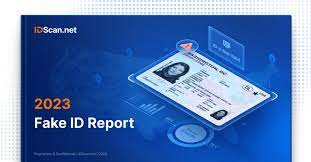In today’s digital age, the allure of acquiring a fake id is stronger than ever. But beyond the superficial appeal of flashing an ID that grants access to age-restricted places or activities, lies a world fraught with ethical, legal, and personal consequences. This article delves into the multifaceted nature of fake IDs, exploring their origins, uses, and the broader implications they have on individuals and society.
The Genesis of Fake IDs
The concept of a fake ID isn’t a modern invention. The practice of creating and using counterfeit identification has roots that extend back centuries. Historically, fake IDs were often used for more benign purposes, such as avoiding military conscription or circumventing restrictive travel laws. However, with the rise of digital technology and sophisticated printing techniques, the creation and distribution of fake IDs have become more accessible and widespread.
The Mechanics of Fake ID Production
Creating a fake ID today involves a combination of digital artistry and advanced printing technologies. Modern counterfeiters use high-resolution printers, laminating machines, and computer software to produce convincing replicas of official documents. The process typically starts with obtaining a template of a legitimate ID, which is then altered to reflect the desired changes, whether it’s a different name, age, or other personal details. The final product is designed to mimic the appearance and feel of an authentic ID as closely as possible.
The Allure of Fake IDs
The appeal of fake IDs is driven by a range of motivations. For many young people, particularly teenagers, the desire to access bars, clubs, or purchase alcohol often outweighs the risks associated with using a fake ID. For others, fake IDs can serve as a means of bypassing age restrictions for online services or gaming platforms. Beyond the youthful impulse, some individuals use fake IDs for more serious purposes, such as identity theft or fraudulent activities.
Legal and Ethical Implications
The use of fake IDs is illegal in many jurisdictions, and the penalties for being caught can be severe. In addition to facing criminal charges, individuals may also encounter civil liabilities and long-term consequences that impact their future opportunities. Legal repercussions can include fines, probation, or even imprisonment, depending on the severity of the offense and the laws of the specific region.
Ethically, the use of fake IDs raises significant concerns. It undermines the trust and integrity of systems designed to ensure safety and fairness, such as age restrictions on alcohol or access to certain services. By circumventing these regulations, individuals contribute to a broader societal problem that impacts not only themselves but also the community at large.
The Digital Era and Fake ID Challenges
The digital era has introduced new challenges in the realm of fake IDs. Online marketplaces and dark web forums offer platforms for buying and selling counterfeit identification, making it easier for individuals to obtain fake IDs without traditional physical barriers. Additionally, digital technologies have enabled more sophisticated methods of creating convincing fake IDs, which complicates efforts to detect and prevent their use.
Combating Fake IDs: Prevention and Awareness
Efforts to combat the proliferation of fake IDs involve a combination of legal enforcement, technological innovation, and public education. Law enforcement agencies and regulatory bodies work to crack down on counterfeit operations and enhance detection methods. Technology companies and institutions are increasingly implementing advanced verification systems, such as biometric authentication and digital ID technologies, to better protect against fraud.
Public awareness campaigns also play a crucial role in addressing the issue. Educating individuals about the legal consequences and ethical implications of using fake IDs can help deter potential offenders and promote a culture of integrity and respect for the law.
Conclusion
The world of fake IDs is a complex and multifaceted issue that extends beyond the simple act of acquiring a false document. It involves a web of motivations, legal challenges, and ethical dilemmas that impact individuals and society as a whole. As technology continues to evolve, so too will the methods used to combat the misuse of fake IDs. Understanding the broader implications and working towards effective solutions will be essential in addressing this ongoing challenge.

